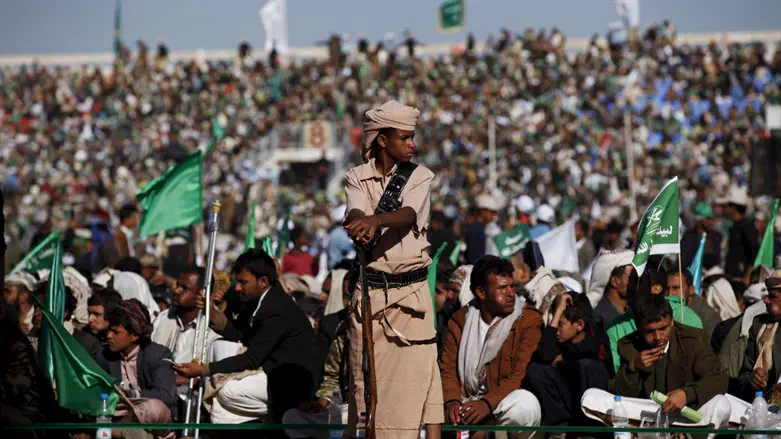
The Houthi rebels in Yemen have become a common point of discussion in the Western world since the beginning of the Swords of Iron War. They are known for missile launches against Israel and attacks on international shipping, but little else. Who are the Houthis, and what brought them to such a situation?
Background
The group's official name is Ansar Allah. The Houthi moniker is derived from the Yemeni tribe from which most of their members are drawn.
The group began by positioning itself as leading the Zaydi Shia revival during the 1990s. Working under the name 'Believing Youth', they clashed with the Yemeni government on multiple occasions. This led to their nominal leader being killed in one such clash. Following his death, mass arrests, and the US invasion of Iraq in 2003, the movement became radicalized and adopted its official slogan: "God is the Greatest, Death to America, Death to Israel, Curse be Upon the Jews, Victory to Islam."
Over the next decade, the Houthis carried out a violent but successful insurgency, eventually overthrowing the government, dissolving the Parliament, and seizing control of government offices in the capital of Sana'a. Their success was heavily attributed to the IRGC, which is widely believed to have supplied them as part of a proxy war against Saudi Arabia. With the fall of their own proxy, the Yemeni government, in 2015, the Saudi government led a coalition of Gulf states in a series of attacks on Houthi targets.
Prompted by suspected Iranian backing, the Houthis continued their attacks on other countries in the region, including both Saudi Arabia and the UAE. Although the Saudi-led coalition continued to fight back, UN pressure to allow humanitarian aid deliveries prevented them from cutting off the Hodeidah port - a main artery for both trade and supplies.
The group was briefly designated a terrorist organization by the first Trump administration, a decision reversed shortly after the Biden administration took office.
Saudi Arabia continued fighting the movement until early 2023. Unable to collapse the movement militarily, the Saudis began direct negotiations with them and were reportedly nearing a deal when the October 7th massacre occurred.
Red Sea Crisis
As part of Iran's attempts to threaten Western control of the Middle East, the IRGC heavily invested in both replenishing and advancing the Houthi arsenal depleted by years of battling their own government and Saudi Arabia. The attempt included the personal efforts of Iran's powerful and later assassinated IRGC officer Qassem Soleimani and included engineering expertise and the use of Iranian vessels to gather intelligence and provide coordination. One of these, the Saviz, was targeted and damaged by an Israeli mine attack.
The Houthis eschewed the idea of rebuilding larger vessels and instead focused on the creation of smaller, heavily armed patrol boats, remote-controlled kamikaze boats, and a wide range of sophisticated missiles and UAVs to attack ships from the shore. Their success in damaging several vessels has significantly impeded shipping through the Suez Canal, causing notable economic damage worldwide and fomenting the US-led coalition Operation Prosperity Guardian to bomb dozens of Houthi targets.
Domestic Policy
Although they have allegedly established a legal system, courts, prisons, and government offices in areas they control, numerous international reports have found that the Houthi governance relies more on force of arms than a code of laws. Summary executions, extortion by kidnapping or protection rackets, and crimes against women, LGBTQ individuals, dissenters, and foreigners have all been reported over the years.
Given their ongoing state of war, the Houthis are also widely believed to use child soldiers, embed themselves in civilian areas, force civilians to accompany them, and divert humanitarian aid shipments intended for those impacted by the war.
For all of this, the Houthis have stated that they reject the idea of an Islamic government as instituted in Iran, citing that their Zaydi faith and the tribal history of Yemen would be incompatible with the Iranian model. Some of their policies, particularly towards women, are significantly more permissive than those existing under the regimes of the IRGC or the Taliban.
Foreign Backing
Although not openly stated, various reports have surfaced of countries other than Iran backing the movement. A Wall Street Journal report found that Russia has been supplying targeting data and small arms to the movement. Israel has reportedly captured debris from North Korean missiles used by the Houthis in their ongoing attacks against Israel.
China has not yet been discovered supplying military equipment, but continues to support the movement in another way - China is nearly the only remaining buyer of Iranian oil, providing significant funding to both Iran and its proxies.
Looking Forward
Both the Prosperity Guardian coalition and Israel have indicated that they are intent on ending the Houthi attacks as soon as possible, with the coalition in particular having stepped up airstrikes in recent days.
Should that prove unsuccessful, a ground offensive against the Houthis is possible, either from the Western coalition or from a Saudi-led Gulf coalition. Israel is unlikely to launch a large-scale offensive, but may assign special forces to raid key facilities in a similar manner to operations carried out against Syrian targets before the fall of the regime, or raids planned against Saddam Hussein's military.
The incoming Trump administration, as part of its ongoing push to end the regional conflict and hardline policy against Iran, may follow Israel's lead in attacking or blockading the Hodeidah port despite humanitarian concerns. In such a case, the drop in aid supplies could see the people of Yemen beginning to turn on the Houthis until humanitarian aid is restored.
Irrespective of steps taken by other countries, Israel has pledged to continue attacking the Houthis until they cease their missile launches toward Israel. Ambassador Danny Danon recently stated plainly to a special meeting at the UN, "Two thousand kilometers will not be enough for the Houthis to avoid the same fate as Hamas and Hezbollah."
